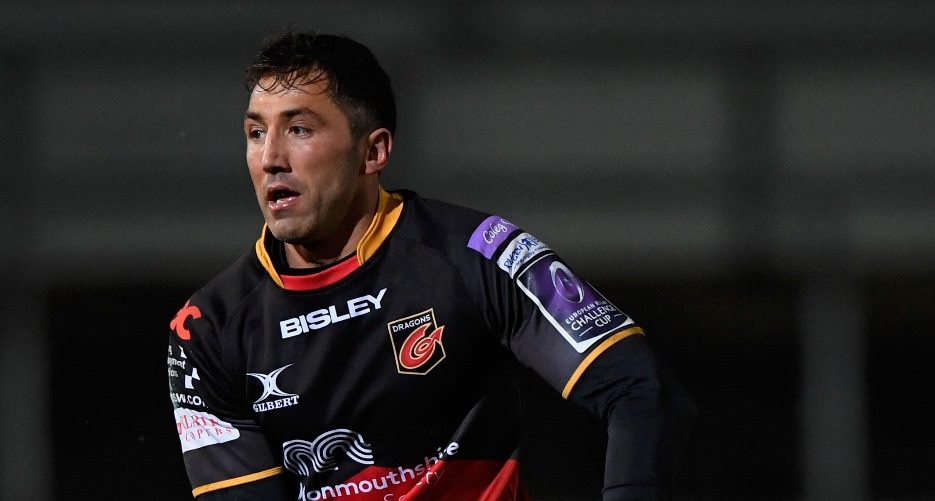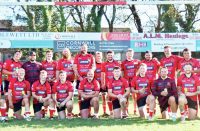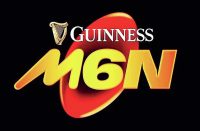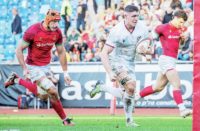By Brendan Gallagher
YOU would never know it from their lowly position in the Pro14 – just two wins this season – but there seems to be a surge of hope down in my old stomping ground of Gwent with a strong expectation that the Dragons are poised finally – well next season – to start breathing fire after 20 years of failing to make sense of professional rugby.
They have, in effect been taken over by the WRU, a red hot young business tyro David Buttress has been put in charge, Ross Moriarty and Richard Hibbard have been signed with a raft of other big names promised and best of all – in my opinion – there are plans to play some matches around the region at venues other than Rodney Parade. That process will start next month at Eugene Cross Park when the Dragons will entertain Glasgow.
“I’m fully aware of the strength of feeling and the power and influence of rugby throughout the area,” says Buttress. “We know we have a challenge ahead to create a competitive modern Dragons which is truly representative of its region and which supports the 73 clubs of Gwent.”
Gwent, the most populous of the Welsh counties and regions has always been a rugby powerhouse although it has frequently – some would say wilfully – been misunderstood and underappreciated by Wales and the WRU.
The prime example of that was the sheer stupidity of originally naming the professional franchise Newport Gwent Dragons. Anybody who has ever spent five minutes in the region could have told you that would immediately hack off the rest of the county/region. Why single out Newport as the only name to be preserved? At a stroke the rest of the region felt alienated and irrelevant and it has taken decades to right that wrong.
Newport’s assumption of pre-eminence – real enough sometimes based on results but at other times a boastful claim lacking any substance – has provided the narrative for Gwent Rugby throughout their history as they waged rugby war with the other local senior clubs such as Pontypool, Newbridge, Ebbw Vale, Abertillery, Cross Keys and Tredegar.
That made for fantastic rivalries and explosive, well-attended derbies. Frankly it was a reporter’s delight as I discovered when I immersed myself in the madness of Gwent rugby between 1985 and 1988 working for the South Wales Argus and the South Wales Echo.
A glorious sporting mayhem reigned full of angry controversies, on-field fisticuffs, black eyes, angry pointing fingers, outrage, bans, threats, suspended fixtures and fabulous rugby.
By then the Wales team may have fallen from their lofty perch – although they still stuffed England every two years in Cardiff – but for those last few halcyon years Welsh club rugby was still comfortably the best in Europe, a match for anywhere on the planet. And Gwent was at its epicentre.
The only thing that united the fractious teams was a shared loathing and distrust of Newport and the only thing that united the county itself – including Newport – was its lasting hatred and suspicion of the fancy dans of Cardiff and the mercurial wizards of West Wales much lionised by the influential Western Mail and BBC Wales. Even the ‘Black and bloody Ambers’ were better than that nest of vipers.
Gwent as a rugby region sensed a conspiracy and I rather suspect they had a point. For years David Bishop was denied his rightful place in the Wales team on account of his volatile temperament and occasional willingness to use his fists, yet the equally volatile and pugilistic Richard Moriarty of Swansea was made Wales captain.
Every act of thuggery Pontypool committed was seized upon gleefully, yet similar acts of foul play from Swansea, Cardiff, Neath and Llanelli were rarely acknowledged let alone commented upon.
The tough men from Pontypool were somehow heroes when they played for Wales but villains when they put it about for Pooler. The ‘Cardiff Press’ – as the Mail and Echo were always termed in Gwent – would wax lyrical about the latest wonderkid from Cardiff or the latest sorcerer from way west, yet during my time in Wales I never saw a more skilful back than Newbridge and Newport fly-half Paul Turner who only grudgingly got a mention in despatches. From the outside looking in it was bizarre.
Of course, it was that raging anger and chip on the shoulder that often drove the Gwent clubs and individuals on, and ironically Gwent rugby needs to recapture the collective outrage of those years, not least because it would help redefine their identity.
I’d be the first to admit that Gwent rugby could be a tad eccentric and incredibly parochial at times, but as a rugby tragic and young reporter that was part of its attraction.
When I joined the Argus sports desk in 1985 I had answered an advert in the UK Press Gazette to become the Pontypool rugby man, assuming that some big hitter would naturally get the post. Ray Prosser’s side at the time were arguably the strongest club side in the world, they played nearly 50 games a season and lost four or five top whack in a bad year.
A dream job you might think although I did, just for a second, wonder why the club’s local paper was advertising a job that was surely much coveted internally.
I soon found out. Despite having this world-beating club on its door, Pooler used typically to get ten pars a day on an inside page. It didn’t matter if they had just beaten Cardiff by 40 points and Bishop had scored a hat-trick or if five of their pack had just been named in the Wales squad it was ten pars. Meanwhile Newport, who were pretty dire at the time, colonised the entire back page of a broadsheet with three or four separate stories analysing their latest sorry debacle and humiliation.
Deep down in Newport minds – the paper was based in Newport – Pooler were still considered a small town Gwent valley side and would on occasions get little more space than Blaenavon or Risca or Abercarn. It was extraordinary and in a very real way one of the reasons Pooler faded so dramatically from the scene. There was no appreciation of them outside their small valley.
The one exception was on Saturdays when, with acres of space to fill we went from famine to feast and a 1,500 word runner would be required for the sports edition. They had no literary merit whatsover – I know because I wrote the things – but come 5.45pm fans would be queuing out of Pooler’s clubhouse to buy them, hot off the press literally.
The potential seven-day readership was there but Newport were always considered the only story to the detriment of all else, the never ending default setting that has bedevilled Gwent rugby.
Very quickly I found myself reporting on all the Gwent teams save for Newport which was the preserve of others and what an absolute rugby joy that was. Abertillery Park was unexpectedly grand, a strange Roman ruin of a ground with its crumbling terraces overgrown with grass and weeds suggesting a lost civilisation, although a couple of times I saw it nearly full for fierce midweek derbies against Pooler which was the scalp they coveted more than any.
Eugene Cross Park was Ebbw Vale’s citadel and also a big ground which also hinted at glories past. The splendid Roy Lewis was king of all he surveyed there and produced the best and most erudite programme notes in all of Wales, possibly Britain.
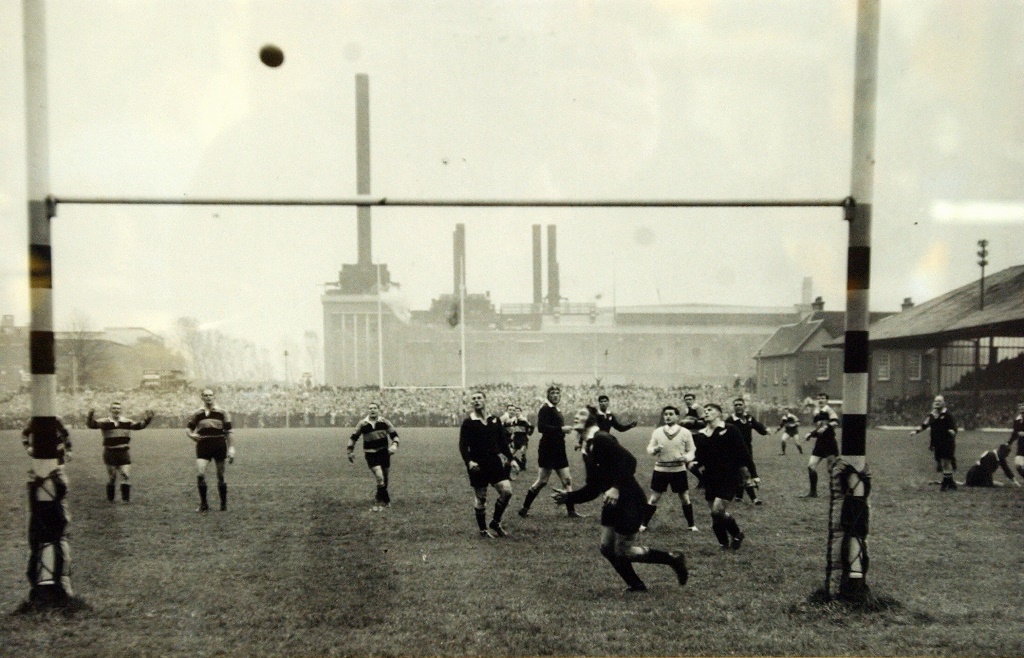
Mine host at Tredegar was a Trevor Howard lookalike and soundalike by the name of Byron Denning. As the sleet and hail came down – it was always deep winter in Tredegar even when early spring had sprung down in Newport – Byron sat in in the corner of a snug, heated wooden hut which served as the five man Press box.
Wife Olwen passed over steaming mugs of coffee laced with whisky to lubricate Byron’s throat before he flicked the switch and treated the crowd to his latest witticism or scathing comment. Or even occasionally the try scorer and score. What a voice, second only to Richard Burton.
Newbridge was a small, friendly clubhouse, always full of merriment and their side, even after the sainted Turner left for Newport, invariably played an exciting if fallible brand of rugby. Their games with Pontypool were absolutely brutal, a clash of styles and attitudes.
Pandy Park, home of Cross Keys, boasted a lovely new clubhouse which was in stark contrast to their dilapidated wooden stand which somehow defied gravity most weeks and remained upright. Keys always had the best burgers. You remember these things on frozen January nights.
And then of course there was Pooler in their pomp. A friendlier club off the field you couldn’t meet although it was always a tense moment every Saturday after the match when the players, getting stuck into their third or fourth pint, started reading the Argus for mistakes and ‘unfair’ criticism. Skipper John Perkins was the most avid reader of all and I tended to place myself in his vicinity awaiting judgement. He would slowly digest every last word and if he nodded his approval it was free grog all night for the man from the Argus. Any frowns and curses and I made my excuses and left.
There was always a heaving crowd at Pontypool Park, the terrace jam packed by kick-off time and there were always, infamously, hundreds of ‘walkers’ getting a free view from the hillside above. Strangely all wore Pooler scarves. Even in midweek it would be absolutely rammed for the visits of Cardiff, Llanelli and heathen English invaders such as Gloucester.
It was a vibrant, intoxicating scene and even at the next level down – Blaenavon, Garndiffaith, Abercarn, Pontypool United – the standard was very decent and crowds enthusiastic. But, always, what struck me most was the complete lack of affinity with Newport, who were absolutely detested by all and sundry.
In stark contrast when I ventured west and covered Llanelli they were clearly the ‘mother club’ for that region. West Walian clubs would automatically and uncomplainingly feed their best players to the Scarlets, junior matches would kick off early so that fans and players could attend the Scarlets match. Yes, if one of the junior clubs drew Llanelli in the Welsh Cup unofficial warfare was declared for 80 minutes, but after the final whistle everybody was as thick as thieves again.
Cardiff was similar – it was all very cosy with Glamorgan Wanderers and Penarth – although for a few years an excellent Pontypridd team did ruffle some feathers and threaten Cardiff’s dominance in south and mid Glamorgan and a very feisty rivalry kicked off. Alas Ponty became one of the least deserving victims of professionalism, a great big-hearted club that found themselves in the wrong place at the wrong time.
The Swansea-Neath rivalry in west Glamorgan was a huge problem to overcome – two historic and strong clubs traditionally competing for the same talent pool – and it has taken an eternity for the Ospreys to create a separate identity. It’s been a struggle and there has been no high profile European final or semi-final to promote the brand but you feel they are getting there.
Which brings us back to Gwent the county with arguably the biggest rugby footprint in Wales, historic and present. Back in the day those seven senior clubs I listed comprised just over 40 per cent of the 17 clubs in the Welsh merit table, yet come the revolution that was somehow distilled down to one franchise that for too long has been too closely associated with just the one club and name. Newport.
The challenge now is to change that perception and reboot the region’s rugby passion. It’s not the only thing that needs doing and the Dragons will never breathe fire until they truly become Gwent’s team. Their template must be Munster and the way all their great local clubs – bitter rivals – forged an identity and how the entire region enjoys every minute of Munster’s successes.
In fact, I’m not sure they should even be called the Dragons which seems a tad whimsical and romantic for the Gwent psyche. On the county’s coat of arms the Lion rampant features just as prominently as the Dragon. The county’s motto is utrique fidelis – faithful to both – celebrating the loyalty of their renowned archers to both Wales and England over the centuries.
The Gwent Lions has a much better sound to me. Gwent is Welsh but very different to the rest of Wales with its own history. The rugby side need to represent that.
